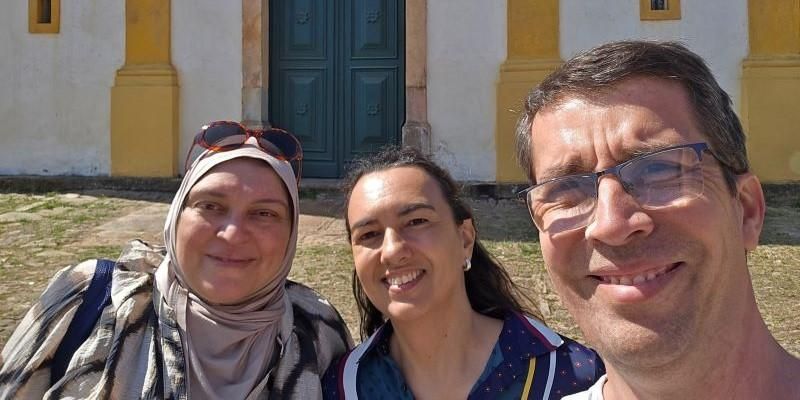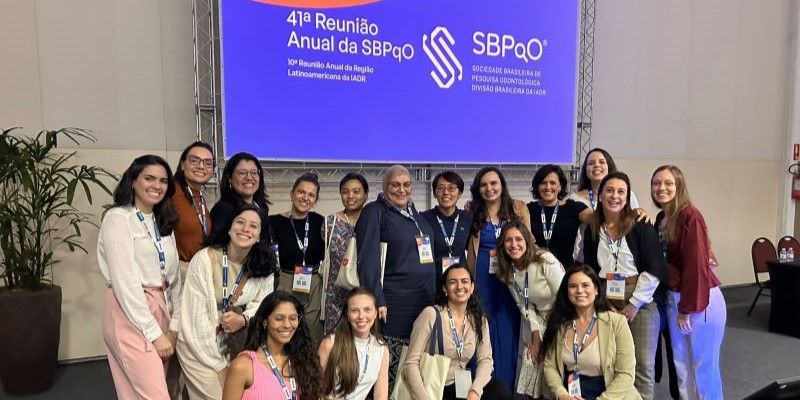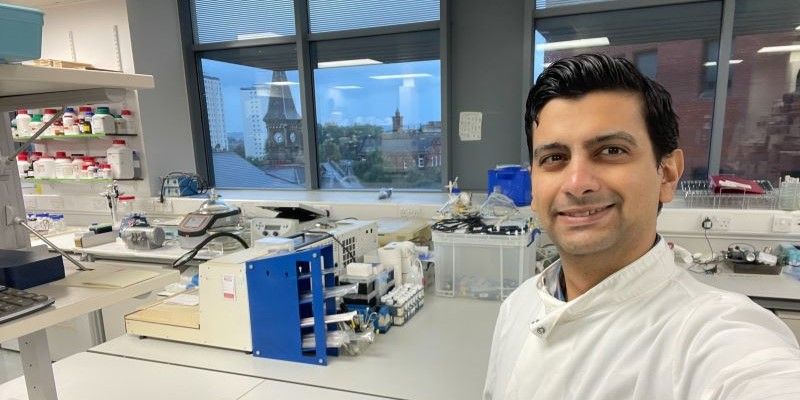The world is facing an antibiotics crisis. According to the World Health Organisation, not enough new antibiotics are being developed while resistance to those we have is growing. This resistance – caused primarily by the misuse and overuse of antibiotics and other antimicrobials – is putting many of the advances of modern medicine at risk.
Many people are unaware that one of the drivers of antimicrobial resistance is dentistry. Ten percent of prescriptions of antimicrobials worldwide are made by dentists, and the issue is highlighted by many national and international professional associations. However, the subject is not covered in enough detail in dentistry training.
Another issue is that there are few alternatives that dentists can use to treat or prevent infection, which don’t run the risk of causing resistance.
For Dr Reem El Gendy, Lecturer in Oral Biosciences at the University of Leeds School of Dentistry (LSoD), this presents both a challenge and an opportunity in the battle against antimicrobial resistance (AMR).
“Dentists are undoubtedly contributing to the growth of antimicrobial resistance, often unwittingly,” she says. “But that also means that dentists could really make a difference, if we can change how antimicrobials are used in our profession. There are two ways that we can bring that change about – through education and through research into new alternatives.”
Dr El Gendy is pulling together an international collaboration with universities in Brazil and Egypt to tackle AMR using both approaches. With funding from the University of Leeds International Strategy Fund, five universities are creating a shared online learning module on AMR, for use in teaching dental undergraduates. Running alongside this ambitious plan are international research projects and clinical trials, testing the effectiveness of natural antimicrobials in dentistry.
Teaching across borders
Creating an international undergraduate teaching module and a Collaborative Online International Learning (COIL) module in dentistry is a huge challenge – it needs to be designed for use across three continents and apply to different education and healthcare systems.
Dr El Gendy explains: “Our module is breaking new ground. It will be the first to target undergraduate students in an international collaborative design, fulfilling the ‘partnership in education’ UN global goal. Of course, a human mouth is the same everywhere in the world, so the basic science and clinical dentistry are straightforward. But the regulations around antibiotic prescriptions differ by country, as do the processes for qualification to practice.
“Some universities would like the module to form a compulsory part of their dentistry degree, while for others it may be optional, which creates different expectations on content and marking. But that’s the nature of international collaborations – it requires substantial negotiation and discussion to find a way forward that suits all parties.”
The aim is to create an online module that can initially be followed by all dentistry students at the five universities involved in the COIL module. This, alongside the University of Leeds, includes two institutions from Brazil – the University of Brasilia (Dr Naile Dame Texiera) and the Federal University of Minas Gerais (Professor Mauro Henrique Abreu, Professor Cristiane Bendo, and Professor Raquel Vieira Andrade) – and two from Egypt – Suez Canal University (Professor Dalia Fayyad, Professor Marwa Sharaan and Dr Nelly Abdelsalam) and Alamein International University (Professor Yehia Abushady and Professor Rania El-Backly).

The ten top-scoring students on the module from each institution will then be invited to work together in international teams – each team will have one student from each university – to develop a presentation on an aspect of the module. These will then be judged by an academic panel, and the winning team will be invited to take part in an international research conference on AMR in dentistry, to be held at the University of Leeds.
More recently, the British University in Egypt (BUE) joined the network. A team of six staff members from BUE have begun contributing to the module design and delivery under the leadership of the Faculty of Dentistry’s Internationalisation team, Professor Doaa Ragaii and Professor Noha Kabil.
The long-term goal is to make the module available in the future to all dentistry students worldwide, to increase the knowledge of antimicrobial resistance amongst all those entering the profession.
Alternative plant-based antimicrobials from food and food waste
Running alongside this curriculum development are a number of research projects testing and comparing natural alternatives to standard antibiotics, such as pectin, cashew nut shell extracts, and frankincense, which do not provoke microbial resistance. These alternatives have the potential to be more sustainable, particularly those derived from food waste.
Cashew nut shell extract and frankincense are both at an early stage of development, and so are being studied in the lab before clinical trials can start. One cashew nut shell extract has been developed by the University of Brasilia, and Dr El Gendy is collaborating with Professor Thuy Do (LSoD) and Dr Naile Dame Texiera (University of Brasilia) to look at its effectiveness on the bacteria responsible for tooth decay and root canal infections.

Pectin is widely used in food and pharmaceuticals – although not as an antimicrobial – which means products are already available and can be used with patients. Omar Khaled Elsayed Montaser, dental practitioner and Assistant Lecturer in Endodontics at Suez Canal University, is currently running the first clinical trial using pectin in root canal treatment for his PhD, partly funded by the ISF award to Dr El-Gendy.
Omar is comparing the effectiveness of pectin to the gold-standard antimicrobials, taking samples from patients with root canal infection before and after treatment with pectin. The samples are then analysed at the University of Leeds, using DNA sequencing where possible to identify the change in bacterial composition in response to pectin treatment.
Omar spent a month in Leeds working on this analysis. He says, “Walking into the Division of Oral Biology, Leeds School of Dentistry felt like coming into the United Nations – it was such a globally diverse team with researchers from the UK, Saudi Arabia, Kuwait, Iraq, India, China and Egypt. It was a very supportive atmosphere with a real exchange of knowledge. I learned a huge amount, particularly around DNA sequencing techniques, and was also able to share some of the expertise gained through my clinical practice in Egypt.”

“As a specialist in endodontics, I see the impact of AMR in my practice every day, where successfully treating infections can make the difference between success and failure in procedures like root canal treatment. If infections continue to become more complex to treat, then saving infected teeth is going to become much more difficult, and these procedures may simply no longer be possible.”
Omar is still recruiting patients to take part in the trial, after initial results from the analysis showed promising outcomes.
Dr El Gendy has recently been awarded funding from the British Council through their International Science Partnership Fund. This will support three early-career researchers from Egypt to come to the University of Leeds to work jointly on research. One of the projects they will join is developing natural, alternative antimicrobial biomaterials for use in regenerative dentistry.
While new antimicrobials like these may be available in the future, Dr El Gendy believes dentists can start to make a change straight away.
“All our work in this project and others is helping to raise awareness about tackling AMR in dentistry, and hopefully make dentists think differently about how they prescribe antimicrobials,” she says.
While individually our impact is small, as a global academic partnership we can really make a difference.